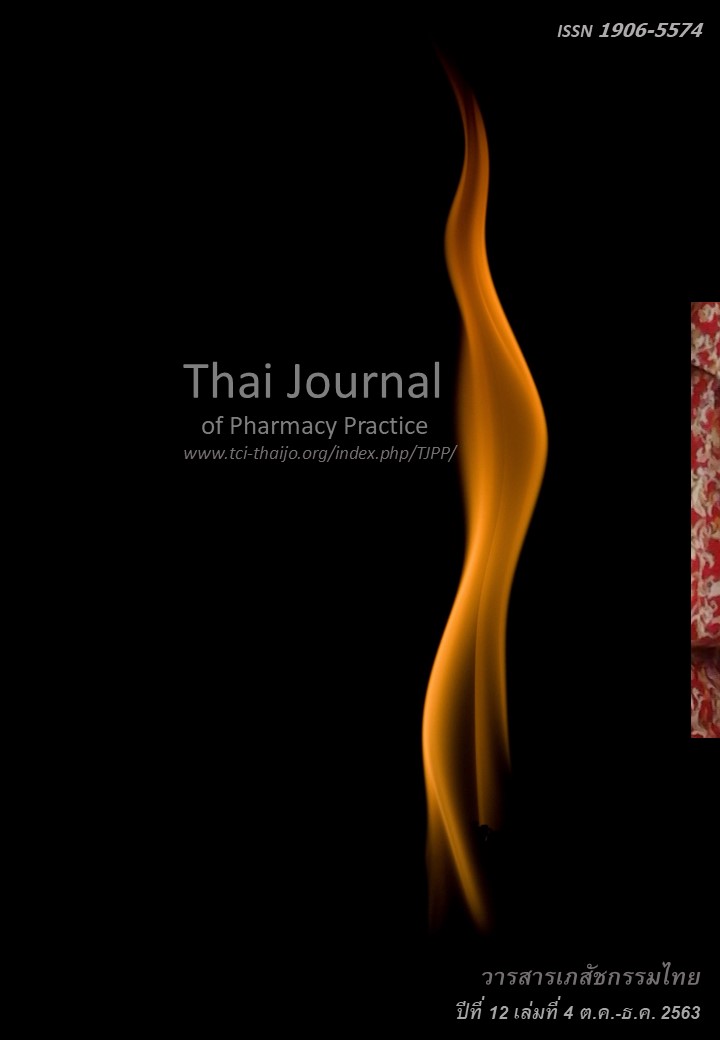ความซับซ้อนของระบบสุขภาพที่มีผลต่อพฤติกรรมการใช้ยาปฏิชีวนะ ของประชาชนกลุ่มชาติพันธุ์ในอำเภอแม่แจ่ม จังหวัดเชียงใหม่
Main Article Content
บทคัดย่อ
วัตถุประสงค์: เพื่ออธิบายความซับซ้อนของระบบสุขภาพที่มีผลต่อพฤติกรรมการใช้ยาปฏิชีวนะของประชาชนกลุ่มชาติพันธุ์ในอำเภอแม่แจ่ม จังหวัดเชียงใหม่ วิธีการ: การศึกษานี้เป็นการวิจัยเชิงคุณภาพโดยการสัมภาษณ์เชิงลึกร่วมกับการสังเกตและการวิจัยเชิงเอกสาร ผู้ให้ข้อมูลเป็นผู้ที่มีประสบการณ์มาก 32 ราย (กลุ่มชาติพันธุ์ที่ใช้หรือแสวงหายาปฏิชีวนะ 10 คนและผู้ให้ข้อมูลบริบทของชุมชน 22 คน) การวิจัยใช้ทฤษฎีแบบจำลองการอธิบายโรคเพื่อหาปัจจัยในระดับบุคคลและทฤษฎีนิเวศวิทยาสุขภาพเพื่อหาปัจจัยแวดล้อมระดับบุคคลจนถึงระดับนโยบาย ร่วมกับทฤษฎีเรื่องความซับซ้อน การวิเคราะห์ข้อมูลใช้การวิเคราะห์แก่นสาระ ผลการวิจัย: การนิยามแผลและอาการเจ็บว่าเป็น “การอักเสบ” ประกอบกับการรับรู้จากบุคลากรทางการแพทย์ว่า “ยาแก้อักเสบ” รักษา “อาการอักเสบ” และประสบการณ์การรักษาของตนและผู้อื่น มีส่วนสร้างทัศนคติต่อการใช้ยาปฏิชีวนะของกลุ่มชาติพันธุ์ ปัจจัยภายนอกตัวบุคคลมีหลายมิติ เช่น ความสัมพันธ์ในชุมชน ระบบสังคมวัฒนธรรมของกลุ่มชาติพันธุ์ สภาพเศรษฐกิจ ลักษณะการประกอบอาชีพ ความทุรกันดารของพื้นที่ นโยบายการดำเนินการงานคุ้มครองผู้บริโภคและส่งเสริมการใช้ยาสมเหตุผลของภาครัฐ การขาดแคลนบุคลากรสาธารณสุข และการเข้าไม่ถึงบริการสุขภาพที่มีประสิทธิภาพ การเข้าถึงยาปฏิชีวนะได้ง่ายทั้งในสถานสาธารณสุขของรัฐและเอกชน รวมถึงร้านยาและร้านขายของชำ ล้วนเกี่ยวพันกันเป็นความซับซ้อนที่ส่งผลต่อพฤติกรรมการใช้ยาปฏิชีวนะ สรุป: พฤติกรรมการใช้ยาปฏิชีวนะของกลุ่มชาติพันธุ์ มีความซับซ้อนทั้งจากปัจจัยภายในตนเองและปัจจัยภายนอกที่เชื่อมโยงกัน การเข้าใจความซับซ้อนนี้จะช่วยให้การส่งเสริมการใช้ยาปฏิชีวนะอย่างสมเหตุผล มีความรอบด้าน สอดคล้องกับปัญหาได้มากขึ้น และยั่งยืน
Article Details
ผลการวิจัยและความคิดเห็นที่ปรากฏในบทความถือเป็นความคิดเห็นและอยู่ในความรับผิดชอบของผู้นิพนธ์ มิใช่ความเห็นหรือความรับผิดชอบของกองบรรณาธิการ หรือคณะเภสัชศาสตร์ มหาวิทยาลัยสงขลานครินทร์ ทั้งนี้ไม่รวมความผิดพลาดอันเกิดจากการพิมพ์ บทความที่ได้รับการเผยแพร่โดยวารสารเภสัชกรรมไทยถือเป็นสิทธิ์ของวารสารฯ
เอกสารอ้างอิง
Carlet J, Collignon P, Goldmann D, Goossens H, Gyssens IC, Harbarth S, et al. Society’s failure to protect a precious resource: antibiotics. Lancet 2011; 378: 369-371.
Sumpradit N, Suttajit S, Poonpolsub S, Chuanchuen R, Prakongsai P. Landscape of antimicrobial resis- tance situation and action in Thailand. Bangkok: Coordinating and Integration Antimicrobial Resist- ance Committee; 2015.
Phumart P, Potha T, Thamlikitkul V, Riewpaiboon A, Prakongsai P, Limwattananonta S. Health and economic impacts of antimicrobial resistant infections in Thailand: A preliminary study. Journal of Health Systems Research; 2012: 6: 352-60.
Maechaem District Health Office. The annual report 2014: Report of the inspector General of the Ministry of Public Health Region 1. Chiang Mai: Maechaem District Public Health; 2014.
Boonpeng K. Perception about antibiotics and antibiotics request of hill tribes at Panghinfon sub-district, Maechaem District, Chiang Mai Province [independent study]. Chiang Mai: Chiang Mai University; 2014.
Buddhachinaraj Hospital. Knowledge about the use of antibiotics in patients receiving services in the outpatient department Buddhachinaraj hospital.Phitsanulok: Buddhachinaraj Hospital; 2004.
Kinkajorn V, Kanchanavishirakul S. Antibiotics use behavior of patients in health promotion hospital, Regional Health Promotion Center 3 [online]. 2011[cited Jun 20, 2019]. Available from: hpc6.ana mai.moph.go.th/images/research/som1.pdf
National Health Security Office (NHSO) Region 1, Chiang Mai. Percentage of antibiotic use in Region 1, Chiang Mai (URI, AGE).Chiang Mai: National Health Security Office Region 1; 2014.
Greenhalgh T, Papoutsi C. Studying complexity in health services research: desperately seeking an overdue paradigm shift. BMC Medicine 2018:95.
Cohn S, Clinch M, Bunn C, Stronge P. Entangled complexity: why complex interventions are just not complicated enough. J Health Serv Res Policy 2013 ;18: 40–3.
Braithwaite J, Churruca K, Ellis LA, Long J, Clay-Williams R, Damen N, Herkes J, Pomare C, Ludlow K. Complexity science in healthcare-aspirations, approaches, applications and accomplishments: a white paper. Sydney: Macquarie University; 2017.
Greenhalgh T. How to implement evidence-based healthcare. Oxford: Wiley; 2017.
Campbell M, Fitzpatrick R, Haines A, Kinmonth AL, Sandercock P, Spiegelhalter D, Tyrer P. Framework for design and evaluation of complex interventions to improve health. BMJ. 2000; 321 : 694-6.
Kleinman A. Patient and healers in the context of culture: An exploration of the borderland between anthropology, medicine, and psychiatry. California: University of California Press; 1980.
Vantamay S. Guidelines for prevention of health risk behaviors according to the study guidelines social ecological model. [dissertation].Bangkok: Chulalong korn University; 2008.
Ngamwittayapong A and Nonthakitnoppakao N. Complexity in development work: Introduction to change. Bangkok: Thai Health Promotion Founda- tion; 2014.
Preskill H. Complexity propositions for practice 2014 [cited Apr 18, 2016]. Available from: www.fsg.org.
Chuengsatiansup K. Health cultural and remedies: social concepts and medical anthropology. Nontha buri: Health Systems Research Institute, Ministry of Public Health; 2007.
Craig P, Dieppe P, Macintyre S, Michie S, Nazareth I, Petticrew M. Developing and evaluating complex interventions: Medical Research Council (MRC) [online]. 2018 [cited Jul 19, 2019]. Available from: mrc.ukri.org/documents/pdf/complex-interventions-guidance/
Design Institute for Health. Design in health. [online]. 2019 [cited Jul 19, 2019]. Available from: www.de signinhealth.org/
Essack S, Sartorius B. Global antibiotic resistance: of contagion, confounders, and the COM-B model. Lancet Planet Health 2018; 2: e376-e377
Sumpradit N, Tangkaew V, Autsawakitvire V, Jongtrakul P, Anuwong K, Pumtong S, et al. Scaling up of the ASU project Antibiotics Smart Use. Bangkok: Health Systems Research Institute; 2009.
Thailand Food and Drug Administration. Accelerate government policy through Thai innovation to support the 20-year national strategy [online]. 2018 [cited Jul 19, 2019]. Available from: gnews.apps.go .th/news?news=25187


